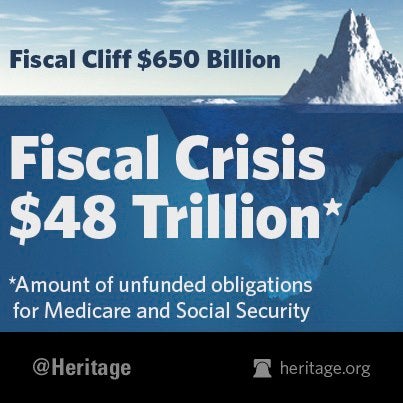Representative Nancy Pelosi (D-CA) called it “a happy start to a new year.” That probably tells you all you need to know about the fiscal cliff deal that passed the House last night.
The bill—which President Obama has promised to sign, though he took off for Hawaii again after the vote—has a 10 to 1 ratio of tax increases to spending cuts. This is the President’s version of a “balanced” approach.
In addition to tax increases on Americans making more than $250,000 a year, the bipartisan deal will actually raise taxes on the vast majority of American workers. How? The payroll tax “holiday” has ended. The Wall Street Journal calculates that the “typical U.S. family earning $50,000 a year” will lose “an annual income boost of $1,000.”
Meanwhile, the higher tax rates will hit small businesses and investors—which is grim news for a country in need of new jobs.
“It is the small businesses that employ the most workers who will pay the higher rates,” explains Heritage’s Curtis Dubay. “These tax hikes on investment will further dampen investment and result in even less job creation. This is more bad news for the 12 million unemployed Americans.”
While the President touted a “balance” of tax hikes and spending cuts, the truth is that the bill increases government spending by about $330 billion.
Though Congress and the President have known for two years that they would have to do something about all the expiring tax rates, they waited until after the deadline had passed. This resulted in lawmaking for which “irresponsible” is not a strong enough word.
The Senate voted without knowing the cost of the bill—the Congressional Budget Office had not even had time to go through it.
The legislation passed both chambers of Congress within a 24-hour period on a holiday, which meant that Members of Congress—much less the American people—did not have time to find out what was in the 157-page bill.
Business Insider notes that all of the new tax rates are “‘permanent,’ meaning that Congress would have to agree to change them. This is a big deal. Almost every fiscal agreement reached by Congress since the Bush tax cuts of 2001 has been scheduled to phase out at a future date.”
After all the damage this deal has done, Congress isn’t through yet. Well, this Congress is—the outgoing lawmakers make their exit on Thursday, and the new Congress will be coming in. It will face the real consequences of the across-the-board budget cuts to defense known as sequestration, which this deal postponed for two months.
It will also face the U.S. debt limit. President Obama said last night that he is in no mood to get into another debt limit fight—even though that is inevitable.
“While I will negotiate over many things, I will not have another debate with this Congress over whether they will pay the bills they’ve already racked up,” Obama said.
But that debate is coming. This time, rather than grandstanding, Obama must deliver on his promise of a “balanced approach,” now that he has locked in his class warfare tax hikes. That means reforms to rein in entitlement spending in particular. The $650 billion fiscal cliff distracted from the $48 trillion looming fiscal crisis—the long-term funding obligations of Social Security and Medicare.
Without spending cuts and real entitlement reforms, that fiscal iceberg remains dead ahead.
Quick Hits:
- Many conservatives have publicly criticized the fiscal cliff deal.
- New year, new laws! More than 29,000 new laws were passed by state legislatures in 2012 and are now in effect.
- The New York Times’s China correspondent had to leave the country after the Chinese government did not renew his visa.
- At the Rose Parade in Pasadena, CA, yesterday, a soldier hidden aboard a parade float surprised his wife and son with his homecoming.
- Listen online to Istook Live!, the radio show of former Congressman Ernest Istook, broadcasting from The Heritage Foundation every weekday from 9 a.m.-noon ET.





























